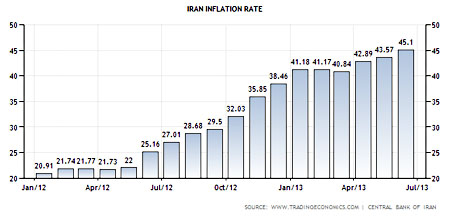The crippling effect of ever-tightening economic sanctions—which have halved oil exports and produced ruinous inflation—along with the election of a new  president, seems to have nudged Iran into getting serious about negotiating some kind of truce with the West:
president, seems to have nudged Iran into getting serious about negotiating some kind of truce with the West:
In a near staccato burst of pronouncements, statements and speeches by the new president, Hassan Rouhani; his foreign minister, Mohammad Javad Zarif; and even the supreme leader, Ayatollah Ali Khamenei, the leadership has sent Rosh Hashana greetings to Israel via Twitter, released political prisoners, exchanged letters with President Obama, praised “flexibility” in negotiations and transferred responsibility for nuclear negotiations from the conservatives in the military to the Foreign Ministry.
“They’re putting stuff out faster than the naysayers can keep up,” said Gary Sick, an Iran expert with Columbia University. “They dominate the airwaves.”
….The current moment differs significantly from an earlier reform period under President Mohammad Khatami, when the rules on public behavior and freedom of expression were relaxed. But in contrast to the current situation, Mr. Khatami never had the serious backing of the Iranian political establishment. “Our supreme leader, Mr. Khamenei, has given the green light; that means there will be no groups trying to sabotage potential talks like in the past,” Mr. Ghorbanpour said.
The chart above shows the official inflation rate, which is currently running at about 45 percent annually. As bad as that sounds, outside experts reckon that it’s even worse, upwards of 60 to 100 percent. Both Rouhani and Khamenei know that this spells political trouble if it keeps up, which gives them a genuine motive for working toward a rapprochement with President Obama. Beyond that, the civil war in Syria must be giving them pause for thought too. Not much has been going their way recently, and one way or another they need to turn that around.
I don’t think anyone who’s ever dealt with Iran is willing to get too optimistic about this until there’s been a whole lot more progress than we’ve seen so far. But since I have nothing to feel optimistic about domestically, I’d really like to at least feel optimistic about something internationally. Until this latest round of quasi-dialogue collapses into the usual set of missed opportunities and mutual recriminations, it will have to do.










